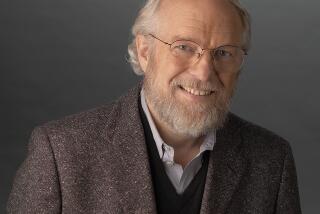Paul Baran dies at 84; inventor helped lay foundation for Internet
Paul Baran, who helped build the foundation for the modern Internet by devising a way to transmit information in chunks, has died. He was 84.
He died Saturday at his home in Palo Alto of complications from lung cancer, said his son David.
Paul Baran became one of the pioneers behind “packet switching,” which helps a communications network withstand an attack by bundling and dispatching data in small packages, while working on Cold War military research for the Rand Corp. in Santa Monica in the 1960s. The Department of Defense used that concept in 1969 to create the Arpanet, which laid the foundation for the modern Internet.
President George W. Bush acknowledged Baran’s contribution by presenting him the National Medal of Technology and Innovation in 2008, a year after he was inducted into the National Inventors Hall of Fame.
Vinton Cerf, a vice president at Google Inc. who is considered one of the fathers of the Internet, said Monday that his longtime friend was a “technological iconoclast,” an unusually prolific thinker and inventor who, over a career that spanned six decades, dreamed up “holy cow” ideas years before anyone else thought them possible.
Baran had more than two dozen patents and started seven companies, five of which went public. He is credited with advancing innovation in cable modems, computer printers, satellite transmissions, interactive television, remote reading of power meters, even airport metal detectors.
David Baran said his father’s friends at the Los Angeles Police Department used to supply him with confiscated weapons to test a doorway gun detector for federal buildings. His father’s design was later used by the Federal Aviation Administration in airports to thwart hijackings.
David Baran recently found one of his father’s papers from 1966 predicting that people would shop and get news on online networks. He plans to donate that paper and others, many never published, to Stanford University to give broader circulation to his father’s thinking.
Paul Baran never sought credit for himself, always distributing it to others, his friends and former colleagues said. “He believed innovation was a team process,” longtime friend and Silicon Valley futurist Paul Saffo told The Times on Monday.
Baran was born April 29, 1926, in Grodno, Poland. His parents moved to the United States in 1928, and he grew up in Philadelphia. He graduated from Drexel University with a bachelor’s degree in electrical engineering in 1949.
He tested parts of radio tubes for Eckert-Mauchly Computer Corp. in Philadelphia before moving to Los Angeles. He took a job with Hughes Aircraft working on radar data processing systems while getting a master’s degree in engineering from UCLA.
After joining Rand in 1959, he became interested in insulating communications from a nuclear attack. British scientist Donald Davies independently hit on a similar idea. Baran famously compared the development of the Internet to building a cathedral, with many hands over hundreds of years laying the foundation with none able to claim responsibility for the whole project.
He left Rand in 1968 and later co-founded the Institute for the Future, a nonprofit forecasting group that studied the impact of computers. But his enduring legacy is in Silicon Valley, where he inspired companies with his ideas and entrepreneurs with his advice.
“Right up until his death, Paul had his fingers in lots of pies,” Saffo said. “Every time I saw him he was always nurturing a new company or helping a new innovator. With his passing we have just lost a vast amount of knowledge of how to turn ideas into products that change the world.”
Baran’s wife, Evelyn, died in June 2007. In addition to his son, David, of Atherton, Calif., he is survived by three grandchildren.
More to Read
Start your day right
Sign up for Essential California for the L.A. Times biggest news, features and recommendations in your inbox six days a week.
You may occasionally receive promotional content from the Los Angeles Times.





